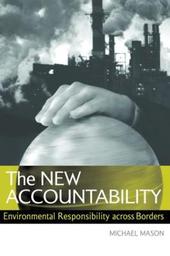
|
The New Accountability: Environmental Responsibility Across Borders
Paperback
Main Details
| Title |
The New Accountability: Environmental Responsibility Across Borders
|
| Authors and Contributors |
By (author) Michael Mason
|
| Physical Properties |
| Format:Paperback | | Pages:222 | | Dimensions(mm): Height 234,Width 156 |
|
| Category/Genre | Pollution and threats to the environment
Social impact of environmental issues |
|---|
| ISBN/Barcode |
9781844070671
|
| Classifications | Dewey:333.7 |
|---|
| Audience | | Undergraduate | | Postgraduate, Research & Scholarly | | Professional & Vocational | |
|---|
| Illustrations |
Figures, tables, index
|
|
Publishing Details |
| Publisher |
Taylor & Francis Ltd
|
| Imprint |
Earthscan Ltd
|
| Publication Date |
1 December 2004 |
| Publication Country |
United Kingdom
|
Description
The growth of pollution that crosses national borders represents a significant threat to human health and ecological sustainability. Various international agreements exist between countries to reduce risks to their populations, however there is often a mismatch between national territories of state responsibility and transboundary hazards. All too often, state priorities do not correspond to the priorities of the people affected by pollution, who often have little recourse against major polluters, particularly transnational corporations operating across national boundaries. Drawing on case studies, The New Accountability provides a fresh understanding of democratic accountability for transboundary and global harm and argues that environmental responsibility should be established in open public discussions about harm and risk. Most critically it makes the case that, regardless of nationality, affected parties should be able to demand that polluters and harm producers be held accountable for their actions and if necessary provide reparations.
Author Biography
Michael Mason is Lecturer in the Department of Geography and Environment, London School of Economics and author of Environmental Democracy (1999)
Reviews"How do we hold parties that are responsible for environmental damage accountable for their actions? In addtiona, how do we move beyond a minset that tends to think of accountability as being pertinent primarily within national borders and involving governmental actors exclusively? Mason (London School of Economics) addresses these two questions, and in the course of providing answers, he makes three useful points. First, parties causing environmentla harm should be answerable to the injured parties, irrespective of their place of residence or nationalities. Second, those entrusted with the duty of protecting the vital ecological conditions of life ought to take harm prevention, democratic inclusion, and impartiality iinto account in their deliberations. Third, a key regulatory challenge is to think about way in which liability constraints might be incorporated into economic activities that fall outside the purview of extant treaties. Readers may take issue with specific points Mason makes, and his book would have profited from some discussion of the evolution of new norms of public accountability. Nevertheless, this volume is valuable for those interested in ways to meaningfully expand the domain of public accountability in the environmental arena. Summing Up: Recommended. Public, academic, upper-division undergraduate and up, and professional library collections."--A. A. Batabyal, Rochester Institute of Technology in CHOICE
|